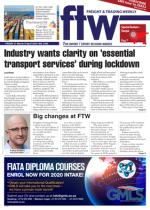South African shippers are advised to keep a close watch on the European Union (EU) as it negotiates a trade agreement with the United Kingdom, considering it has played its cards very close to its chest.
According to Professor Gerhard Erasmus, a lawyer and associate at the Trade Law Centre (t r a l a c), the EU has given no indication of its preferences, minimum or maximum demands – or much else to date, unlike the UK which has been outspoken about what it wants out of Brexit.
“Anything can still happen in these negotiations and the EU has, as yet, not drawn any lines in the sand. What does remain clear is that Brexit is by no means going to be made into a friendly signal to all its other members about leaving the union, but rather serve as a firm warning that withdrawing from the customs unions is not beneficial to anyone.”
Erasmus said given the tough negotiations to date, challenging times could be expected ahead. All indications are that the parties are heading for an almighty clash. Already UK Prime Minister Boris Johnson has said the UK will not be bound by the political declaration attached to the withdrawal agreement he has agreed with the EU. The EU on the other hand stands firm in its contention that the declaration must be followed to a tee.
According to Erasmus both sides are clearly eager to engage in talks and get on with the process as soon as possible. The UK officially left the EU on January 31, although little will change for the next few months. It will continue to operate inside the EU’s single market and customs union allowing for unimpeded trade and the free movement of people.
The first round of talks started earlier this month with both the EU and the UK indicating that a fair trade agreement was a priority. A deadline of December 31 has been set for the finalisation of this trade deal. “I won’t be surprised if the deadline is not met. Both parties have already indicated that they don’t think there is enough time before the end of the year to address everything,” said Erasmus.
Commenting on what would happen should no new UK-EU deal be made, Erasmus said they could either extend the deadline, postponing the current transition phase where the UK continues to trade within the EU. “That would be the most logical thing to do. The second option is for the UK to fall back on to basic World Trade Organization terms, but these are much stricter rules and would see the country trading at much higher tariffs all around the world.

